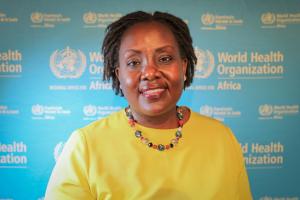Meet team WHO: Dr Fiona Braka, Team Lead, Emergency Operations
A public health professional with an MPH from Johns Hopkins Bloomberg School of Public Health, Dr Fiona Braka has worked for World Health Organization (WHO) for the past 18 years supporting countries, including her native Uganda, Ethiopia and Nigeria, to build capacity to deliver vaccines. She is now bringing her vast experience in polio eradication and broader immunization to support the continent’s fight against disease outbreak emergencies and humanitarian crises.
What drives your commitment to this work?
My belief is that every life is precious, and that we all have a responsibility to help the vulnerable and save lives. If we want to safeguard both current and future generations, we must ensure that all children and people, wherever they are, have an equal shot at a bright and productive future.
In Africa, the job is a challenging one, considering the continent experiences over 100 public health threats every year, over 80% of these from infectious causes and the other 20% from humanitarian crises like floods, conflict and famine. It’s critical that countries have the capacity to respond timeously and effectively to avert the impact on human life, and that’s what drives my work.
My journey with WHO, from the country office to the international level, has really given me the opportunity to witness the strength of working in county level to build capacity to effect real change. But it’s also illustrated to me the incredible power of public health interventions to save lives, particularly one intervention – vaccines.
What are you most proud of?
Polio eradication has been a significant part of my work at WHO, and it was a big moment when, in August last year, the African Region celebrated the declaration by the African Regional Certification Commission that the continent is now free of wild polio. This was especially significant considering the devastation in 2016, when as Immunization Team Lead for WHO Nigeria, we again detected the presence of the wild virus in that country after nearly two years without a single case.
The last wild polio virus cases were in the most difficult to reach places due to conflict in north-eastern Nigeria. We had to rethink our strategies to ensure children in insecure areas are reached with vaccines and that surveillance was sensitive to detect any suspect cases. It called for innovation, flexibility and strong collaboration among a range of actions. The dedication and bravery of frontline polio teams were simply remarkable.
Nigeria was the last polio endemic country in Africa, and one of only three worldwide, so being part of that success was a real privilege. But it also afforded us valuable experience in coordinating other emergencies as we did maximize the capacities of the programme to improve integrated disease surveillance, reach more children with other vaccines, and respond to outbreaks such as measles, yellow fever, meningitis, cholera and more recently COVID-19.
How is COVID-19 different from other health threats?
COVID-19 is highly transmissible and is impacting lives across and beyond the continent, causing illness and death. But the massive, more visible impact we see is on livelihoods and economies.
Like other diseases, COVID-19 is a health crisis that requires a strong, coordinated approach across all levels of WHO and the world. We know that vaccine interventions work in preventing severe disease and death, but to be successful we need to have the necessary supply, we must be able to deliver the vaccines, and we must be able to sensitise communities of the benefits so they will accept – and even demand – the vaccine. We have seen that a comprehensive approach of public health and social measures, and vaccination can make a difference, but there is still a lot of work to do in ensuring these are uniformly and equitably applied in all countries.
The COVID-19 pandemic has demonstrated the importance of investment in health. The knowledge and science behind the available tools we have today to curb the spread of the virus, including vaccines, have advanced at such an accelerated pace since the pandemic was declared in early 2020. We know a lot more today than we did at the beginning of the response. The collaboration of many actors in driving different aspects of the response is unprecedented.
At the same time, it’s important to acknowledge that while COVID-19 is demanding most of our attention, that doesn’t mean that other crises affecting lives and wellbeing aren’t continuing to occur. We have humanitarian crises right now in the Tigray Region of Ethiopia, in South Sudan, in Mozambique, Madagascar and the Democratic Republic of the Congo, among others. It’s a balance we have to achieve in ensuring that no crisis goes unattended; every life does count.
Ultimately, I believe that Africa has learnt a lot from previous health emergencies and is building a stronger foundation to respond to COVID-19 and future outbreaks. But if we are to succeed, we must remain vigilant in ensuring country readiness and capacities are well positioned to respond. We cannot afford to take our foot off the pedal.



